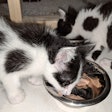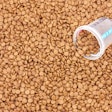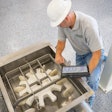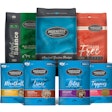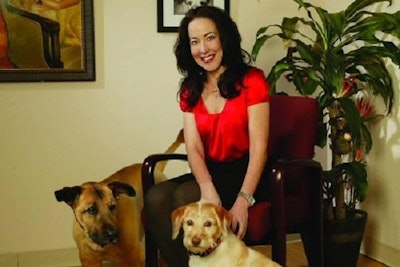
Just four years after starting to make raw dog food in the kitchen of her New York City apartment, Moody moved halfway across the US and opened a plant with cutting-edge, patent-pending technology. Combining this with top-quality ingredients, the company is committed to building a national brand. It seems to be well on its way-since its inception in 2003, Stella & Chewy's sales have doubled each year.
Why raw?
It all began when Moody's dog Chewy, who is now 14 years old, became ill. "I researched raw diets and put him on that, and he recovered," Moody says. "Because I don't have a background in nutrition, I consulted several veterinary nutritionists, particularly one at the University of Wisconsin."
Why raw? "The food is closest to its natural state," Moody says.
"Whole-food nutrition is preferred. It's what we eat primarily," adds Sanford Goodman, who joined the company as CEO in October 2008 after serving in the same role for Nature's Variety. "While raw feeding lacks the rigorous, peer reviewed scientific journal articles documenting specific benefits, there are thousands of consumer testimonials and a developing number of veterinarian case reports. There are a number of veterinarians who recommend raw diets and put animals on them."
No ordinary plant
From making food for Chewy, Moody progressed to selling it to a few independent pet stores in the New York City area. With sales doubling each year, she decided to open a plant. "It was really a passion for wanting to create the kind of petfood I made in my kitchen, on a commercial basis," she says. Having hailed from the Midwest US, she found a building in Muskego, Wisconsin. The plant opened in spring of 2007-but this was no ordinary manufacturing facility.
From the start Moody worked with a couple of experts from the meat industry (for humans) to develop processing methods and environments that would ensure a pathogen-free product. At the time, other raw petfoods were being recalled because of Salmonella contamination, a concern expressed by some veterinarians in recommending raw diets.
One of the experts Moody sought out was James Marsden, PhD, Regents' distinguished professor at Kansas State University in Manhattan, Kansas. "I wasn't sure Marie's vision of pathogen-free was even possible," he says. But both were determined to try, so he contacted a colleague who was using a European method of high water pressure to process meat products for humans. "The method applies 80,000 pounds of pressure per square inch. It doesn't affect the product but destroys pathogens," Marsden explains.
"Vegetative bacteria, which is what Salmonella and E. coli are, respond very well to water pressure," Moody adds. "And it's the only recognized kill step that doesn't use heat, radiation or chemicals, so it's more organic and natural." But she wasn't content. "We're currently the only company-and this includes the human food industry-that uses this process on raw ingredients," she says. Usually it's done post-packaging.
Unique in the world
The innovations don't stop there. "We're unique in the raw food industry," Goodman says. "Nobody else, other than, say, one of the smaller brands, is using high pressure processing. We're the only ones then who have gone a step further and established procedures to prevent recontamination during the forming of the patties."
These later procedures involve applying ultraviolet light to decontaminate the environment and every piece of equipment, building on work Marsden had done in the meat industry. "This is also a very natural process. The combination of treating raw materials using high hydrostatic pressure with aseptic further processing is unique in the world, in both human food and petfood," Marsden says, adding that it has a patent pending. Marsden also helped the company develop its HACCP protocols.
Another thing setting Stella & Chewy's apart is its in-house freeze-drying, which it uses for several product lines. "Frozen is great, but you're not always able to keep it frozen if you're traveling or at a dog show," Goodman explains. "Or you may want a dry product for its convenience. We're taking the same formulation that we produce in frozen form and freeze-drying it."
"Freeze-drying is considered the gold standard of drying-it's the only way you can have a product be dry and raw at the same time," Moody says.
Finally, all Stella & Chewy's products are tested for pathogens and held from shipping until results come back. "Then we post all those results online so customers can match their batch code to a test result," Moody adds.
For fussy eaters
Moody and Goodman also talk up their ingredient quality. "We're using real meat and real organic fruits and vegetables," Moody says. After adding vitamins, minerals, probiotics and other ingredients to assure complete and balanced diets, the mixture is formulated into patties, available frozen or freeze-dried. Freeze-dried treats include Carnivore Crunch and Carnivore Kisses.
For future line extensions, the company is planning to focus on smaller breeds of dogs, reflecting the US pet-owning demographics. "We want to make sure that people with smaller dogs, who may be more attuned to the format and the price point, are, in particular, aware of the product," Goodman says.
The palatability of the products is key, too, Moody says: "A lot of smaller dogs tend to be fussy eaters."
Quality distribution
The company sees another opportunity in increasing independent pet store distribution. Its products are sold only in these outlets, almost solely through distributors, in about 46 of the 50 US states. "A key to growth is having distributors who are experienced at supporting holistic brands, and handling frozen products," Goodman says. "You also need to have a field sales team supporting your stores and marketing your products. We are putting together a top-notch team."
Managing all this growth is a challenge that can keep Goodman up at night. For Moody, it's about "maintaining the quality and initial philosophies as we get bigger," she says. "I don't want to let go of any of that." Considering how well she's done so far, it's no wonder she wants to stay that course.



.jpg?auto=format%2Ccompress&fit=crop&h=167&q=70&w=250)
.jpg?auto=format%2Ccompress&fit=crop&h=167&q=70&w=250)
.jpg?auto=format%2Ccompress&fit=crop&h=167&q=70&w=250)


